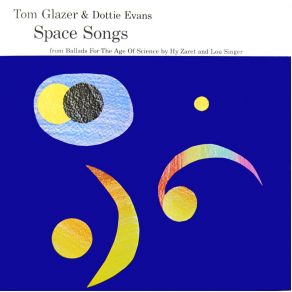Space Songs
Download links and information about Space Songs by Dottie Evans. This album was released in 1959 and it belongs to Pop genres. It contains 15 tracks with total duration of 31:31 minutes.

|
|
|---|---|
| Artist: | Dottie Evans |
| Release date: | 1959 |
| Genre: | Pop |
| Tracks: | 15 |
| Duration: | 31:31 |
| Buy it NOW at: | |
| Buy on iTunes $8.99 | |
Tracks
[Edit]| No. | Title | Length |
|---|---|---|
| 1. | Zoom A Little Zoom | 2:11 |
| 2. | What Is The Milky Way | 2:29 |
| 3. | Constellation Jig | 2:07 |
| 4. | Beep Beep (Here Comes The Satellite) | 1:47 |
| 5. | Why Does The Sun Shine | 2:43 |
| 6. | What Is A Shooting Star | 1:15 |
| 7. | Longtitude And Latitude | 2:07 |
| 8. | It's A Scientific Fact | 1:46 |
| 9. | Ballad Of Sir Isaac Newton | 2:53 |
| 10. | Friction | 2:27 |
| 11. | Why Are Stars Of Different Colours | 1:53 |
| 12. | Why Do Stars Twinkle | 1:50 |
| 13. | What Is Gravity | 2:35 |
| 14. | Planey Minuet | 1:40 |
| 15. | Why Go Up There | 1:48 |
Details
[Edit]Tom Glazer and Dottie Evans appeared on a number of albums in the Singing Science series, a line of educational albums produced by Hy Zaret's Motivation Records for young listeners in the late '50s and early '60s. Glazer was a prolific folk singer, while the lesser-known Evans sang knock-offs of current hit songs for budget labels. Space Songs is one of six albums in the science series and gained a new audience when They Might Be Giants recorded two of its songs: "Why Does the Sun Shine" and "What Is a Shooting Star." The space age theme and the earnest attempt to convey hard science to children give this album much of its goofy appeal, but a great deal of credit goes to composer Lou Singer and lyricist Hy Zaret, both of whom were legitimate talents. When not penning educational tunes, Zaret wrote "Unchained Melody," one of the most popular songs of the 20th century. Guitarist Tony Mottola leads the orchestra, adding to the roster of first-rate artists contributing to this highly accomplished educational album. Space Songs doesn't overwhelm listeners with brain-busting astronomy facts — "Zoom a Little Zoom (Rocket Ship)" is a fun ditty that opens the album, and playful titles such as "Constellation Jig" and "Planet Minuet" reinforce the notion that science and learning can be fun.